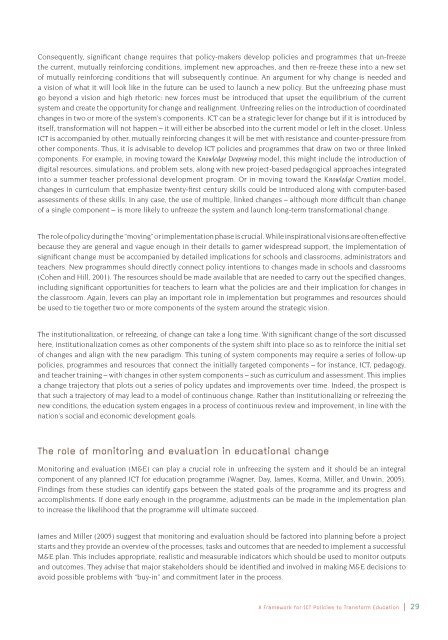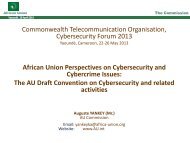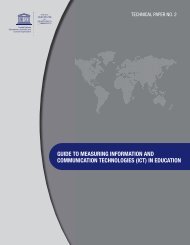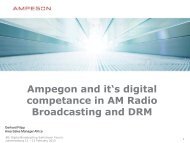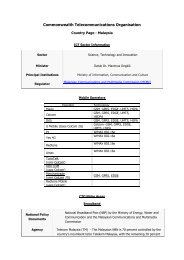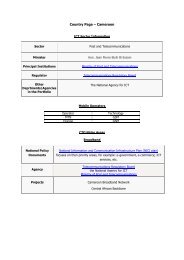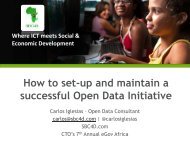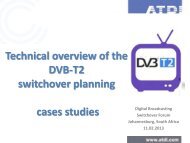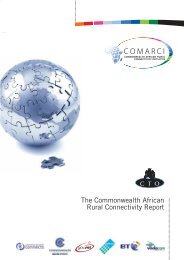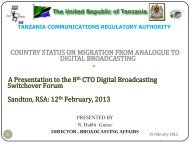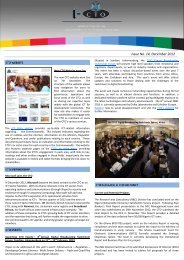Transforming education: the power of ICT policies - Commonwealth ...
Transforming education: the power of ICT policies - Commonwealth ...
Transforming education: the power of ICT policies - Commonwealth ...
You also want an ePaper? Increase the reach of your titles
YUMPU automatically turns print PDFs into web optimized ePapers that Google loves.
Consequently, signifi cant change requires that policy-makers develop <strong>policies</strong> and programmes that un-freeze<br />
<strong>the</strong> current, mutually reinforcing conditions, implement new approaches, and <strong>the</strong>n re-freeze <strong>the</strong>se into a new set<br />
<strong>of</strong> mutually reinforcing conditions that will subsequently continue. An argument for why change is needed and<br />
a vision <strong>of</strong> what it will look like in <strong>the</strong> future can be used to launch a new policy. But <strong>the</strong> unfreezing phase must<br />
go beyond a vision and high rhetoric: new forces must be introduced that upset <strong>the</strong> equilibrium <strong>of</strong> <strong>the</strong> current<br />
system and create <strong>the</strong> opportunity for change and realignment. Unfreezing relies on <strong>the</strong> introduction <strong>of</strong> coordinated<br />
changes in two or more <strong>of</strong> <strong>the</strong> system’s components. <strong>ICT</strong> can be a strategic lever for change but if it is introduced by<br />
itself, transformation will not happen – it will ei<strong>the</strong>r be absorbed into <strong>the</strong> current model or left in <strong>the</strong> closet. Unless<br />
<strong>ICT</strong> is accompanied by o<strong>the</strong>r, mutually reinforcing changes it will be met with resistance and counter-pressure from<br />
o<strong>the</strong>r components. Thus, it is advisable to develop <strong>ICT</strong> <strong>policies</strong> and programmes that draw on two or three linked<br />
components. For example, in moving toward <strong>the</strong> Knowledge Deepening model, this might include <strong>the</strong> introduction <strong>of</strong><br />
digital resources, simulations, and problem sets, along with new project-based pedagogical approaches integrated<br />
into a summer teacher pr<strong>of</strong>essional development program. Or in moving toward <strong>the</strong> Knowledge Creation model,<br />
changes in curriculum that emphasize twenty-fi rst century skills could be introduced along with computer-based<br />
assessments <strong>of</strong> <strong>the</strong>se skills. In any case, <strong>the</strong> use <strong>of</strong> multiple, linked changes – although more diffi cult than change<br />
<strong>of</strong> a single component – is more likely to unfreeze <strong>the</strong> system and launch long-term transformational change.<br />
The role <strong>of</strong> policy during <strong>the</strong> “moving” or implementation phase is crucial. While inspirational visions are <strong>of</strong>ten effective<br />
because <strong>the</strong>y are general and vague enough in <strong>the</strong>ir details to garner widespread support, <strong>the</strong> implementation <strong>of</strong><br />
signifi cant change must be accompanied by detailed implications for schools and classrooms, administrators and<br />
teachers. New programmes should directly connect policy intentions to changes made in schools and classrooms<br />
(Cohen and Hill, 2001). The resources should be made available that are needed to carry out <strong>the</strong> specifi ed changes,<br />
including signifi cant opportunities for teachers to learn what <strong>the</strong> <strong>policies</strong> are and <strong>the</strong>ir implication for changes in<br />
<strong>the</strong> classroom. Again, levers can play an important role in implementation but programmes and resources should<br />
be used to tie toge<strong>the</strong>r two or more components <strong>of</strong> <strong>the</strong> system around <strong>the</strong> strategic vision.<br />
The institutionalization, or refreezing, <strong>of</strong> change can take a long time. With signifi cant change <strong>of</strong> <strong>the</strong> sort discussed<br />
here, institutionalization comes as o<strong>the</strong>r components <strong>of</strong> <strong>the</strong> system shift into place so as to reinforce <strong>the</strong> initial set<br />
<strong>of</strong> changes and align with <strong>the</strong> new paradigm. This tuning <strong>of</strong> system components may require a series <strong>of</strong> follow-up<br />
<strong>policies</strong>, programmes and resources that connect <strong>the</strong> initially targeted components – for instance, <strong>ICT</strong>, pedagogy,<br />
and teacher training – with changes in o<strong>the</strong>r system components – such as curriculum and assessment. This implies<br />
a change trajectory that plots out a series <strong>of</strong> policy updates and improvements over time. Indeed, <strong>the</strong> prospect is<br />
that such a trajectory <strong>of</strong> may lead to a model <strong>of</strong> continuous change. Ra<strong>the</strong>r than institutionalizing or refreezing <strong>the</strong><br />
new conditions, <strong>the</strong> <strong>education</strong> system engages in a process <strong>of</strong> continuous review and improvement, in line with <strong>the</strong><br />
nation’s social and economic development goals.<br />
The role <strong>of</strong> monitoring and evaluation in <strong>education</strong>al change<br />
Monitoring and evaluation (M&E) can play a crucial role in unfreezing <strong>the</strong> system and it should be an integral<br />
component <strong>of</strong> any planned <strong>ICT</strong> for <strong>education</strong> programme (Wagner, Day, James, Kozma, Miller, and Unwin, 2005).<br />
Findings from <strong>the</strong>se studies can identify gaps between <strong>the</strong> stated goals <strong>of</strong> <strong>the</strong> programme and its progress and<br />
accomplishments. If done early enough in <strong>the</strong> programme, adjustments can be made in <strong>the</strong> implementation plan<br />
to increase <strong>the</strong> likelihood that <strong>the</strong> programme will ultimate succeed.<br />
James and Miller (2005) suggest that monitoring and evaluation should be factored into planning before a project<br />
starts and <strong>the</strong>y provide an overview <strong>of</strong> <strong>the</strong> processes, tasks and outcomes that are needed to implement a successful<br />
M&E plan. This includes appropriate, realistic and measurable indicators which should be used to monitor outputs<br />
and outcomes. They advise that major stakeholders should be identifi ed and involved in making M&E decisions to<br />
avoid possible problems with “buy-in” and commitment later in <strong>the</strong> process.<br />
A Framework for <strong>ICT</strong> Policies to Transform Education | 29


